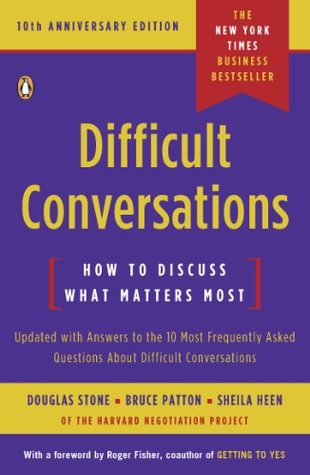More on this book
Community
Kindle Notes & Highlights
Read between
August 5, 2014 - December 11, 2015
When competent, sensible people do something stupid, the smartest move is to try to figure out, first, what kept them from seeing it coming and, second, how to prevent the problem from happening again.
Changing our stance means inviting the other person into the conversation with us, to help us figure things out. If we’re going to achieve our purposes, we have lots we need to learn from them and lots they need to learn from us. We need to have a learning conversation.
When disagreement occurs, arguing may seem natural, even reasonable. But it’s not helpful.
We don’t see ourselves as the problem because, in fact, we aren’t. What we are saying does make sense. What’s often hard to see is that what the other person is saying also makes sense.
Arguing inhibits our ability to learn how the other person sees the world. When we argue, we tend to trade conclusions
There’s only one way to come to understand the other person’s story, and that’s by being curious. Instead of asking yourself, “How can they think that?!” ask yourself, “I wonder what information they have that I don’t?” Instead of asking, “How can they be so irrational?” ask, “How might they see the world such that their view makes sense?” Certainty locks us out of their story; curiosity lets us in.
Separating impact from intentions requires us to be aware of the automatic leap from “I was hurt” to “You intended to hurt me.” You can make this distinction by asking yourself three questions: 1. Actions: “What did the other person actually say or do?” 2. Impact: “What was the impact of this on me?” 3. Assumption: “Based on this impact, what assumption am I making about what the other person intended?”
Other than in extreme cases, such as child abuse, almost every situation that gives rise to a conversation is the result of a joint contribution system. Focusing on only one or the other of the contributors obscures rather than illuminates that system.
Learning that you can’t control the other person’s reaction, and that it can be destructive to try, can be incredibly liberating. It not only gives the other person the space to react however they need to, but also takes a huge amount of pressure off you. You will learn things about yourself based on their reaction, but if you are prepared to learn, you’ll feel free from the desperate need for their reaction to go one certain way.
Sometimes life deals us a blow that we can’t cope with on our own. What constitutes such a blow is different for each of us. It may be something as undermining as rape or as horrifying as war. It may be a physical or mental illness, an addiction, or a profound loss. Or it may be something that would not disturb most other people but does disturb you. We sometimes ascribe valor to those who suffer in silence. But when suffering is prolonged or interferes with accomplishing what we want with our lives, then such suffering may be more reckless than brave. Whatever it is, if you’ve worked to get
...more
Remind yourself that if you think you already understand how someone else feels or what they are trying to say, it is a delusion. Remember a time when you were sure you were right and then discovered one little fact that changed everything. There is always more to learn. Remind yourself of the depth, complexities, contradictions, and nuances that make up the stories of each of our lives.
Anyone who has ever been a kid in a car has uttered the cranky words “Are we there yet?” You know you’re not there yet, and your parents know you know, and so they respond in a tone as cranky as yours. What you really meant was “I’m feeling restless” or “I wish we were there” or “This is a long trip for me.” Any of these would likely elicit a more productive response from Mom and Dad. This illustrates an important rule about inquiry: If you don’t have a question, don’t ask a question. Never dress up an assertion as a question. Doing so creates confusion and resentment, because such questions
...more
An acknowledgment is simply this: any indication that you are struggling to understand the emotional content of what the other person is saying. If the other person says to you, “I’m confused by the fact that you lied to me,” you might say any of the following: Well, it won’t happen again. I should explain that I did not lie. It sounds like you’re overreacting a bit here. Each of these is an understandable response. The first two respond to the substance of what is being said; the third judges the feeling. But none simply acknowledges the feeling, or responds to the invisible questions.
Ten Questions People Ask About Difficult Conversations 1. It sounds like you’re saying everything is relative. Aren’t some things just true, and can’t someone simply be wrong? 2. What if the other person really does have bad intentions – lying, bullying, or intentionally derailing the conversation to get what they want? 3. What if the other person is genuinely difficult, perhaps even mentally ill? 4. How does this work with someone who has all the power – like my boss? 5. If I’m the boss/parent, why can’t I just tell my subordinates/ children what to do? 6. Isn’t this a very American
...more


